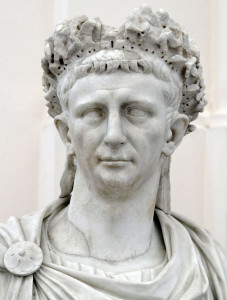 Judeopagan Conflict
Judeopagan Conflict
Berlin Papyrus Inv. 8877; CPJUD. II 156C, Col. 2
Isidoros: “My Lord Augustus, with regard to your interests, Balbillus (e.g. leader of the Alexandria mission) indeed speaks well. But to you, Agrippa (King of Judaea), I wish to retort in connection with the points you bring up about the Jews. I accuse them of wishing to stir up the entire world.
[To the Emperor:] We must consider every detail in order to judge the whole people. They are not of the same nature as the Alexandrians, but live rather after the fashion of the Egyptians. Are they not on a level with those who pay the poll tax?”
But the Emperor, visibly displeased by Isidoros’ sarcasm, would not submit to pressure, and decided in favor of the King Agrippa I, to whom of Judaica bore a debt of gratitude. This decision was to prove fatal for Isodoros: he was guilty of slander, crimen calumniae, equivalent to lèse-majesté in the present case.
An Alexandrian gymnasiarch was not qualified to give a Roman emperor lessons in the art of government. Isidoros was condemned to death (e.g. but not executed).
London Papyrus VI 1912; CPJUD. II 153, Lines 73-104
Emperor Claudius:
With regard to the responsibility for the disturbances and rioting, or rather, to speak the truth, the war, against the Jews, although your ambassadors, particular Dionysios the son of Theon, argued vigorously and at length in the disputation, I have not wished to make an exact inquiry, but I harbor within me a store of immutable indignation against those who renewed the conflict. I merely say that, unless you stop this destructive and obstinate mutual emnity, I shall be forced to show what a benevolent ruler can be when he is turned to righteous indignation. Even now, therefore, I conjure the Alexandrians to behave gently and kindly toward the Jews who have inhabited the same city for many years, and not to dishonor any of their customs in their worship of their god, but to allow them to keep their own ways, as they did in the time of the god Augustus and as I too, having heard both sides, have confirmed.
The Jews, on the other hand, I order not to aim at more than they have previously had and not in future to send two embassies as if they lived in two cities, a thing which has never been done before, and not to intrude themselves into the games presided over by the gymnasiarchoi and the kosmetai, since they enjoy what is their own, and in a city which is not their own they possess an abundance of all good things. Nor are they to bring in or invite Jews coming from Syria or Egypt, or I shall be forced to conceive graver suspicions. If they disobey, i shall proceed against them in every way as seeking to spread a sort of public sickness throughout the world.
If you both give up your present ways and are willing to live in gentleness and kindness with one another, I for my part will care for the city as much as I can, as one which has long been closely connected with us.
For the moment, Claudius would content himself with partial measures: the Jews of Alexandria were forbidden to disturb the games organized by the magistrates of the city and could no longer invite their coreligionists from the Egyptian chora and from Judaea to come to Alexandria. He reprimanded the Jews for having sent him “two delegations” (in other words, they were to work out their problems within their own community before soliciting the Roman government); he reminded them, in passing, that they lived in a city that “was not their own,” meaning that they did not have the rank of full citizens, as we already know. However, since he desired that peace reign in the city, the Emperor would momentarily refrain from immediate prosecution, although the Alexandrian delegation had insisted firmly on this point during a “disputation.”
Source: Joseph Mélèze Modrzejewski. The Jews of Egypt. (p. 172-173, 175-179, 182-183)